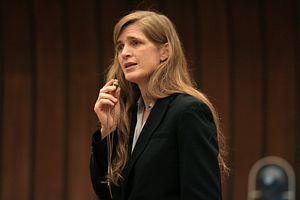Samantha Power, America’s Ambassador to the United Nations (UN), is in India and Sri Lanka from November 18 – 23. In India, she’s set to meet human rights activists, members of civil society and senior government officials. On November 20, she’ll give a speech about UN peacekeeping.
While far less significant on the geopolitical front, Power’s visit to Sri Lanka could be a tricky balancing act. Regarding the Sri Lanka portion of her trip, the U.S. mission to the UN has stated the following:
In Sri Lanka, Ambassador Power will highlight the United States’ commitment to strengthening the bilateral partnership, and she will underscore U.S. support for the country’s efforts toward reconciliation, accountability, and lasting peace in the aftermath of a devastating civil war. In Colombo, she will meet with senior government officials, community leaders, civil society groups, and youth.
While in Sri Lanka Ambassador Power will travel to the northern city of Jaffna to meet with local government officials and organizations and communities affected by the conflict. There, she will meet with members of the local press corps, including by visiting the headquarters of Uthayan newspaper, which was targeted during the war. Ambassador Power will also participate in the inauguration of a new wing of Osmania College, which suffered significant damage during the conflict, as well as tour the Jaffna Library, where she will announce U.S. support for the local restoration of ancient Tamil manuscripts.
This appears to be a busy agenda and Power’s visit to the Tamil-dominated north is an encouraging sign. Unfortunately, Power’s previous comments on Sri Lanka (like many other current U.S. government officials) have not always been helpful. The Barack Obama administration should use Power’s visit as an opportunity to recalibrate Washington’s rhetoric on Sri Lanka. Regrettably, the Obama administration has been way too upbeat about Sri Lanka’s progress since the ouster of Mahinda Rajapaksa. Now is an auspicious time to make a change.
Power needs to speak clearly about the challenges ahead and the concerns regarding the new government’s performance. (And there are many concerns.) Power could express apprehensions about a reform agenda that appears to have stalled. Kusal Perera, a Colombo-based journalist, notes that there is “no clear national program and no political will for much needed reforms.”
Specifically, Power could emphasize the plight of Tamil political prisoners and the urgent need for action. Some political prisoners have been released on bail, though most (out of a number thought to exceed 200) have not. Troublingly, some reports have suggested that released prisoners will participate in the government’s “rehabilitation” program for ex-combatants. This would be a very troubling development. After all, the government’s rehabilitation program is incompatible with international standards and even basic aspects of human dignity. No one else should have to participate in such a controversial and inhumane program.
Ruki Fernando, a human rights activist, has called the release of some political prisoners a welcome first step, even though “it’s wholly inadequate and doesn’t mean justice.” Fernando believes that, in order to prove its sincerity, the government “must share clear and official information” about how many people are being held, how long they’ve been detained and what the status of each prisoner is.
Power could also speak about the consultative processes surrounding the country’s transitional justice plan. It’s not clear where things stand at the moment and the administration of President Maithripala Sirisena needs to clarify, with a degree of detail, how it’s going to handle consultations with community members across a war-torn nation – especially in the heavily militarized north. “Ms. Power must go beyond diplomatic niceties, ask tough questions and speak forthrightly about the continuing human rights abuses,” says Fernando. He believes that “she must also highlight the lack of progress in dealing with past abuses, and challenge the manipulation of Sri Lanka’s commitments to the Geneva resolution.”
With Power’s visit to the island nation, the Obama administration can regain some credibility by dialing down its soaring rhetoric regarding the Sirisena administration’s performance thus far. Perera says that, for a government that’s “not steady economically it’s difficult to balance social issues, when they believe finding answers to minority issues would sway the majority against them,” and that that explains why the Sirisena administration has been so reluctant to release Tamil political prisoners.
Ten months on, Sirisena’s political will remains in question. It’s incumbent upon him to prove, through actions, that Colombo is serious about fulfilling past promises. Power’s visit could signal the beginning of a slightly more realistic stance from Washington. Let’s hope that she seizes the moment.

































